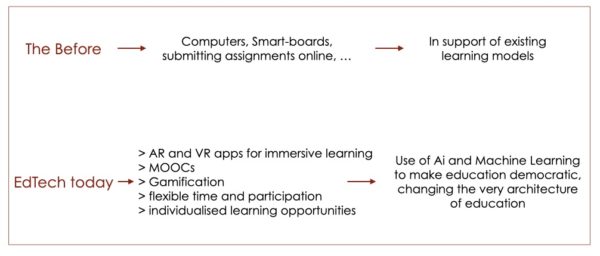We live in the time of the Fourth Industrial Revolution, as coined in 2016 by Klaus Schwab, the founder of the World Economic Forum. Technology has made such ginormous leaps that barriers between the physical, biological and digital are getting blurred. Artificial intelligence, robotics, the Internet of Things, 3D printing, genetic engineering and quantum computing are becoming part of the everyday. It has created a perfect technological storm, changing the very nature of entire industries.
Education technology has always augmented the education sector, working towards making the teaching-learning process simpler. However, it has taken a quantum leap, prompted by the new necessities of the pandemic.
Here’s is a quick look:

New learning architecture is the buzz-phrase associated with EdTech. What does it entail, you ask?
- Immersive learning and better outcomes. Especially with the use of Augmented and Virtual Reality, the very nature of learner experience is upgraded. Experiential learning, through gamification, multimedia, global peer interactions, contributes to increased retention and better application.
- Cost effective. Worldwide, the education industry spends about $4 trillion a year for the upkeep of conventional learning systems. This cost, keeping in mind the increasing population and other limitations is inherently ineffective. However, with digitisation and cloud storage, knowledge can be disseminated in more effective ways.
- For teachers, it means lesser time spent on paperwork and more time to actually focus on students. Online, automatic monitoring of progress, e-portfolios, cumulative assessments will make teachers’ lives easier.
- EdTech certainly shrinks geographical distances, providing opportunities from across the world. Open resources, project-based learning, personalised programs are being normalised as we speak. The only snag here is the digital divide that persists in some parts of the world.
- Paperless classrooms in a world struggling with environmental crises is a huge boost.
- Upskilling needs. STEAM opens out more options than STEM. Interdisciplinary skills are what set you apart in today’s world and EdTech plays a pivotal role in creating those opportunities. For instance, a student of Arts can also jump on to the coding bandwagon because of, you guessed it, EdTech. EdTech is what the world is turning to, to bridge skills gaps.
- From an employment standpoint, subject specialists with a solid Ai/ tech grounding and creative can carve their niche in the backend of the EdTech industry. Even without a tech background, if education is your area of interest, you can find yourself contributing to this industry by tutoring online, collating lesson plans, evaluating or testing/ reviewing EdTech products.
Does this imply the dismantling of traditional systems?Not anytime soon. But, EdTech will phase out those aspects of the education system that are not open to adapt themselves to the changing needs of the society. Learning has and will switch gears towards industrial competency and job skills, considering how automation is replacing most of the unskilled or semi-skilled options. It will keep the entire education sector, including universities and teachers, on their toes. AR and VR will become mainstream and central to the learning process.
EdTech has shown the world that learning is not limited to classrooms and is certainly not a unilateral transference of knowledge from teacher to student. This paradigm shift has implications in every other discipline as it can shape the future of knowledge economy. The dynamic nature of EdTech will allow it to cater to the needs of all industries. With big data and analyses algorithms, you will get to know the most popular courses or the most sought-after ones, depending on what your application suggests.
As long as the digital divide is addressed, EdTech is here for good.








![Best Universities in New Zealand for International Students [2025 Rankings]](https://tcglobal.com/wp-content/uploads/2025/09/Best-Universities-in-New-Zealand-for-International-Students-2025-Rankings-600x338.png)